
Cocktails, art, and music make a heady mix during K2 Friday Nights, where admission is free every Friday from 6:00 to 10:00 PM.
- Café Serai becomes the K2 Lounge, offering a special drink menu to accompany the evening’s DJ, Joey Greiner.
- Arrive early for 2-for-1 drinks from 6:00–7:00 PM.
- Explore all the galleries, dive deeper with an exhibition tour at 7:15 PM, and kick off your weekend with the Rubin.
Coming with friends? Learn about group reservations and tours.
About the DJ

Joey Greiner has been moving dance floors for over 15 years in his native New York City, across the US, and Europe. He weaves deep and funky grooves with Afro and Latin rhythms to lead you on a journey into your most primal instincts to move your body. His wildly popular Tribal Disco party infuses live instruments and performances with energetic DJ sets, creating an unforgettable interactive experience for the crowd.
Lead support for the Rubin Museum is provided by the Milton and Sally Avery Arts Foundation, Bob and Lois Baylis, Barbara Bowman, E. Rhodes and Leona B. Carpenter Foundation, Noah P. Dorsky, Fred Eychaner, Christopher J. Fussner, Agnes Gund, The Robert H. N. Ho Family Foundation Global, the Estate of Lisina M. Hoch, Henry Luce Foundation, The Pierre and Tana Matisse Foundation, Mellon Foundation, Matt and Ann Nimetz, The Randleigh Foundation Trust, Shelley and Donald Rubin, Tiger Baron Foundation, and Ellen Bayard Weedon Foundation.
General operating support of the Rubin Museum of Art is provided by Daphne Hoch Cunningham and John Cunningham, Anne E. Delaney, Dalio Philanthropies, Janet Gardner, Dan Gimbel of NEPC, Inc., The Prospect Hill Foundation, Basha Rubin and Scott Grinsell, Namita and Arun Saraf, Linda Schejola, Eric and Alexandra Schoenberg, Eileen Caulfield Schwab, Jesse Smith and Annice Kenan, Tsherin Sherpa, Tong-Tong Zhu and Jianing Liu, with generous donations from the Museum’s Board of Trustees, individual donors and members, and corporate and foundation supporters.
This program is supported, in part, by public funds from the New York City Department of Cultural Affairs, in partnership with the City Council.
The Rubin Museum’s programs are made possible by the New York State Council on the Arts with the support of the Office of Governor Kathy Hochcul and the New York State Legislature.


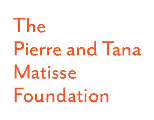





Photo by Filip Wolak
Ages 3 and older with accompanying adults
Join us for Family Sundays at the Rubin! Bring your family to the Mandala Lab on the third floor for an afternoon of creativity and self-exploration that both kids and grown-ups can enjoy.
In honor of Diwali, a holiday that celebrates light overcoming darkness, there will be a series of special programs at this Family Sunday.
FAMILY SUNDAY DIWALI CELEBRATION SCHEDULE:
1:00–3:00 PM
Dazzling Diyas art-making activity ongoing in the Mandala Lab (see below for more details)
1:00–2:00 PM
A special book reading by children’s book author and illustrator Navina Chhabria of her new release, Raaga’s Song: A Diwali Story in the theater followed by a dance performance and workshop with Mei Gumbs. The dance performance will be accompanied by a spirited reading of My Diwali: Lights of Virtue by children’s book author Priya Kumari.
After the reading and workshop, join us for a book signing with authors Priya Kumari and Navina Chhabria and a guided visit to the sculpture of Ganesha with Anu Sehgal, the founder and president of The Culture Tree
Please choose a 1:00 PM Family Sunday ticket to reserve your spot for the theater program.
3:00–3:30 PM
Free mithai (a traditional Indian sweet) tasting in the café with Chef Surbhi of TAGMO
NOVEMBER FAMILY SUNDAYS:
This November, the festival Diwali, which originated in India and celebrates light overcoming darkness, will be officially celebrated in over 10 countries worldwide. Luminous lamps line the streets to usher light and blessings into temples and homes. This month, reflect on the light you bring to the world as you sculpt your own radiant diya (lamp), illuminated with LED lights.

Anu Sehgal is the founder of The Culture Tree, a cultural literacy and language education program. She lives in New York with her husband and her two sons. She is a marketer by profession. She holds an MBA from Yale University and has worked in the corporate sector for almost 15 years. Anu believes awareness of one’s heritage, culture, and language is key for children to become self-aware and confident individuals.
Story Time is presented in partnership with The Culture Tree, an organization that provides South Asian–themed educational and cultural programs that enrich the lives of children and their families and promote a deeper connection with their roots and the world around them.
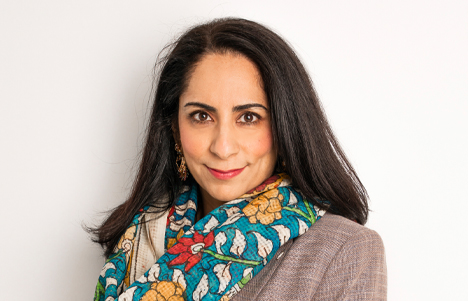
Navina Chhabria is an illustrator, based in Michigan. She discovered a calling for illustration in a previous life, while leading a design team at a tech company. She went on to get her degree in graphic design from Billy Blue College of Graphic Design in Sydney, Australia.
Navina has been working as an illustrator since 2018. Her work can be described as warm, friendly, charming, and fun. Navina’s love of color and strong female characters are a definite nod to her Indian heritage. Her areas of focus are children’s illustration and editorial work revolving around the themes of women, food, and lifestyle.
When she’s not tucked away in her studio, you will find her cooking Indian food, dancing to Bollywood music, or curled up with a book and a hot cup of masala chai.
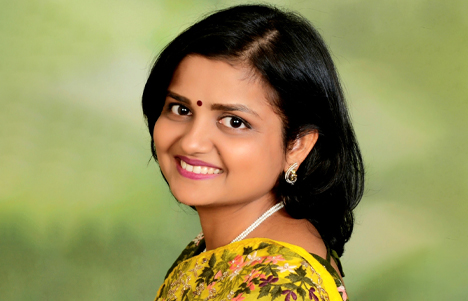
Priya Kumari is a multi-award-winning children’s author and the founder of Eternal Tree Books. Her mission is to publish uplifting books from underrepresented Indian/Asian cultures—diverse stories promoting peace education, emotional hygiene, science of well-being, and cultural competence. Born and raised in the scenic foothills of the Himalayas, she inherited her love of reading and passion for the written word from her father, who owned a bookstore. His Holiness the Dalai Lama, the Tai Situpa, Sharon Salzberg, Lokesh Chandra, Hema Malini, and Ved Nanda have praised her books. Priya lives in New Jersey with her husband and their two sons.
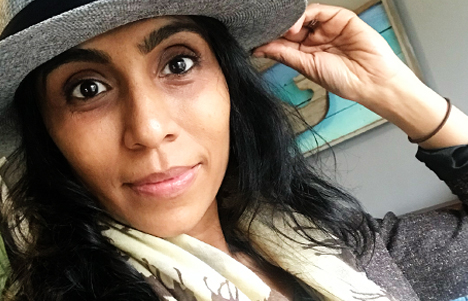
Mei Gumbs is a children’s apparel and graphic designer by trade, but dance has always been her first love. Growing up in Chennai, India, she trained in classical Indian Bharatanatyam from an early age. She went on to gain experience performing both classical and folk dances of India. Later, when she moved to New York to pursue a career in design, she added Latin and international styles such as New York and Cuban style salsa, mambo, tango, and East and West Coast swing to her repertoire.
Mei lives with her husband and 10-year-old in Brooklyn. As a mother raising her mixed race child far away from her native land, she loves the opportunity as a dance educator to share the ancient Indian arts and culture with the young and curious minds of future generations.
Photo by Filip Wolak
Mandala Lab and Family Sundays are made possible with lead support from the Milton and Sally Avery Arts Foundation, Barbara Bowman, Fred Eychaner, Noah P. Dorsky, Agnes Gund, The Robert H.N. Ho Family Foundation Global, the Estate of Lisina M. Hoch, The Pierre and Tana Matisse Foundation, Rasika and Girish Reddy, Shelley and Donald Rubin, and Tiger Baron Foundation.
Major support is provided by Bob and Lois Baylis, Sara and Joseph Bedrick, Anne and Albert Chao, Con Edison, Daphne Hoch Cunningham and John Cunningham, Anne E. Delaney, DeWitt Stern, Karen Dorsky, Chris K. Jones, Think Strong Scholarships, Jack Lampl, Max Meehan, Dan Gimbel of NEPC, LLC, The Prospect Hill Foundation, Sarah and Craig Richardson, Basha Frost Rubin and Scott Grinsell, the Andrew Sabin Family Foundation, Namita and Arun Saraf, Linda Schejola, Eric and Alexandra Schoenberg, Eileen Caulfield Schwab, Tsherin Sherpa, Jesse Smith and Annice Kenan, Taipei Cultural Center in New York, and New York Life Insurance Company*, and New York Life.
This program is supported, in part, by public funds from the New York City Department of Cultural Affairs, in partnership with the City Council.
The Rubin Museum’s programs are made possible by the New York State Council on the Arts with the support of the Office of Governor Kathy Hochul and the New York State Legislature.
This project is supported in part by the National Endowment for the Arts.
We additionally thank the generosity of 223 sponsors and donors who contributed to our 2020 gala, Inside the Mandala: A Virtual Gala.
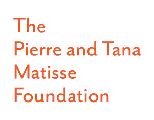


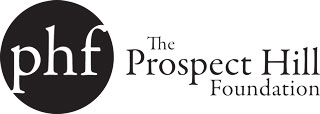





*”NEW YORK LIFE” and the NEW YORK LIFE Box Logo are trademarks of New York Life Insurance Company. Other trademarks are the property of their respective owners.
12:00 PM and 2:00 PM: Tibetan Buddhist cham dance demonstration
Enjoy free admission to the Rubin during the opening weekend of Death Is Not the End, a cross-cultural exhibition that explores notions of death and afterlife through the art of Tibetan Buddhism and Christianity. During a time of great global turmoil, loss, and uncertainty, the exhibition invites contemplation of the universal human condition of impermanence and the desire to continue to exist.
Stop by the lobby at 12:00 PM or 2:00 PM for a demonstration of Tibetan Buddhist cham dance, traditionally performed mostly by monks to observe religious holidays and auspicious events. Being in the audience of cham dance is believed to remove negative energy, bring forth blessings, balance shifting spiritual energies, and increase harmony and peace for all living beings.
Cham Master Lama Ugen Rongdrol Palden will perform the Chitipati, or “skeleton dance,” cham dance, dressed in traditional garments evocative of the Lords of the Charnel Ground, whose image is featured in the exhibition Death Is Not the End. Khenpo Tenzin Norgay Rinpoche will provide descriptions of the symbolism and meaning behind this sacred dance.
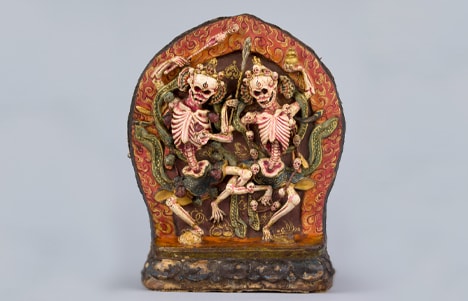
About the Teachers
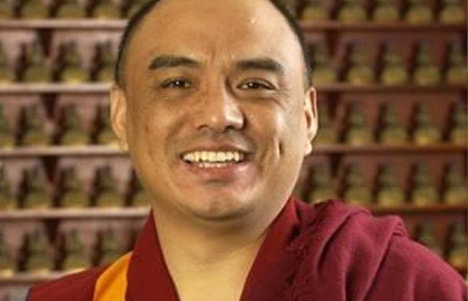
Khenpo Tenzin Norgay Rinpoche was born in Bhutan in 1965. After completing secondary school in 1986, he joined Ngagyur Nyingma Institute, the prestigious Buddhist studies and research center, at Namdroling Monastery in Mysore. At the Institute he studied under Khenchen Pema Sherab, Khenpo Namdrol Tsering, Khenchen Tsewang Gyatso, and other visiting professors, including Khenchen Jigme Phuntsok and Khenpo Pema Tsewang from Tibet. He completed the Shedra program in 1995 and joined the Institute staff, teaching there for three years. He was formally enthroned as Khenpo by His Holiness Penor Rinpoche in 1998 and was assigned by His Holiness to teach at the Buddhist college at Palyul monastery in Tibet. He is the main resident master at Palyul Dharma Center in Queens.
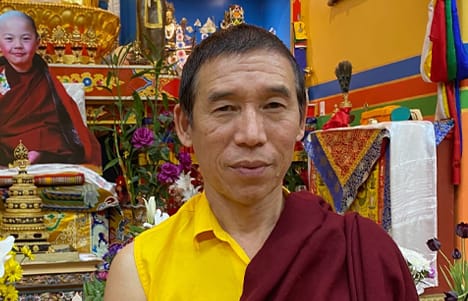
Lama Ugen Rongdrol Palden was born in India, but was sent to Tibet at a very young age to learn the cham dance. He was chosen by H.H. Penor Rinpoche to learn the Palyul cham from the most senior cham masters in Palyul mother monastery in Tibet in the early 1980s, thus becoming the Palyul cham lineage holder. He is often called “Cham-pon” cham master by his students. In 2015 Lama Ugen led sold out adult classes at the Rubin Museum during the exhibition Becoming Another: The Power of Masks. He was also part of Om chanting and solo Bardho Thodrol recording during The World Is Sound exhibition in 2017. He is currently one of the two resident Lamas of Guru Lhakhang New York Palyul Dharma Center in Queens.
Death Is Not the End is supported by the E. Rhodes and Leona B. Carpenter Foundation, Ellen Bayard Weedon Foundation, Robert Lehman Foundation, and The Prospect Hill Foundation.
The Rubin Museum’s programs are made possible by the New York State Council on the Arts with the support of the Office of Governor Kathy Hochcul and the New York State Legislature.
This project is supported in part by the National Endowment for the Arts.



Image credits:
Lords of the Charnel Ground, Smashana Adipati; Tibet; 18th century; painted terracotta; Rubin Museum of Art; C2002.36.1 (HAR 65149); photograph by David De Armas, Rubin Museum of Art, 2012
Immerse yourself in Indian culture on one of the most celebrated days in the Hindu calendar. Celebrate Diwali or Deepavali, also known as the Festival of Lights, with elders from India Home.
An official holiday in India, Sri Lanka, Nepal, and other countries, Diwali symbolizes the spiritual victory of light over darkness, good over evil, and knowledge over ignorance. During the festival, people light up their houses and shops with diyas, small cup-shaped oil lamps made of baked clay.
At the Rubin’s celebration, India Home elders will present a traditional diya dance from India and work with attendees to create intricate rangoli (geometrical designs) out of colored sand and flowers as a gesture of welcoming all.
About the Presenter
India Home is a nonprofit organization dedicated to addressing the needs of the Indian and larger South Asian senior citizen immigrant community. Started in 2007 by a group of healthcare professionals, India Home provides social, psychological, recreational, and spiritual services in a culturally sensitive environment.

Get direct experience with two powerful Tibetan Buddhist practices—prayer wheels and mantra chanting—at this hands-on workshop with chant master Lama Rapjee Wangchuk from Namdroling Monastery.
When you spin a Tibetan prayer wheel in your hand, it is believed to release the positive energy of the thousands of prayers and mantras kept inside. Learn all about the practice of the prayer wheel, a ritual object that is used to set intentions, during a talk by Lama Rapjee Wangchuk. Then add your own written intention to a blessed prayer wheel that you can take home.
Lama Rapjee Wangchuk will also lead the group in mantra chanting, which is used to create collective positive karma. You’ll learn the mantras of beloved Buddhist deities Tara, Avaloketeshwara, and many more.
The program will begin with a tour of The Wheel of Intention at the base of the spiral staircase led by Tashi Chodron, who oversees Himalayan Heritage programs at the Rubin.

The higher ticket price includes a prayer wheel in addition to program admission.
This program was partnered with palyul.org.
About the Speaker
Lama Rapjee Wangchuk is a sand mandala master, chant master, lama dance teacher, and Tsalung (Tibetan Yantra Yoga) champion at the Nyingma Palyul center in upstate New York and Namdroling Monastery in South India. He has performed traditional Tibetan rituals and practices all over the world, especially in New York City and at the Rubin Museum. He is newly appointed as the Resident Teacher of NYC Palyul Dharma Center.
Squad goals from the Himalayas! Experience a mash-up of Kollywood (Hollywood of Nepal), traditional Nepali folk dance, hip-hop, and breakdance at this workshop led by the Nepal Hip-Hop Foundation (NHF). The workshop will begin with a special freestyle performance by NHF at 6:30PM in the Spiral Lobby. Guests will then make their way to the Education Center and be divided into groups led by NHF dance teachers to learn basic dance choreography, which will be performed in the finale of the workshop.
Open to all levels of dancers.
Hip Hop in the Himalayas is an artist exchange program supported by the US Embassy Nepal and coordinated with Nepal Hip Hop Foundation (NHF) and the Rubin Museum.
Presented with the Nepal Hip Hop Foundation
About the Performers
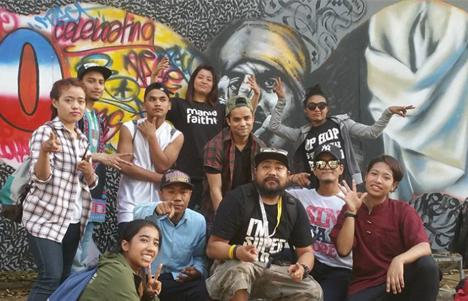
Nepal Hip-Hop Foundation (NHF) is a growing community of dancers, artists, and educators. NHF was established in 2009 with the purpose of offering youth “learn-earn through fun” as alternatives to drug abuse and violence. It is a youth-centered organization that works directly with young people of different backgrounds and ethnicities in Nepal. The organization particularly focuses on the disadvantaged to give them hope and opportunities.
Since its establishment, NHF has been a huge platform in building community leaders and role models, inspiring hundreds of youths/dancers and children in Nepal. NHF believes that everyone can learn and everyone can teach; we all have the capacity to be positive role models to others and leaders in our own communities by bringing positive change. NHF uses hip-hop as a tool for educating and promoting the involvement of youth in social issues.
Experience site-specific dance in the Rubin galleries by some of New York’s most inspiring choreographers, presented in partnership with the arts organization Pentacle. The performances will reflect the theme of power, which radiates from our galleries as part of a yearlong exploration of the topic.
On Wednesday, April 10, witness a performance from choreographer Davalois Fearon at 6:00 PM, 6:45 PM, or 7:30 PM.
Pentacle’s Dance Series at the Rubin Museum of Art is supported by private funds from Mertz Gilmore Foundation and the Howard Gilman Foundation, and by public funds from the New York City Department of Cultural Affairs in partnership with the City Council.


About the Choreographer
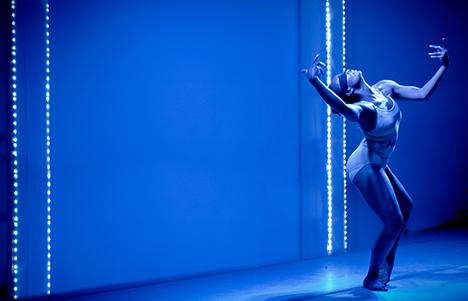
Named by Dance Magazine as one of seven Up-and -coming Black Artists to Have on Your Radar, Davalois Fearon is a Bessie award-winning, critically acclaimed dancer, teacher, and choreographer born on the island of Jamaica and raised in The Bronx. She is the founder and Artistic Director of Davalois Fearon Dance, a company with a mission that pushes both artistic and social boundaries. Her choreography has been presented nationally and internationally, including on Broadway at the New Victory Theater, by the Joyce Theater, the Metropolitan Museum of Art, the Bronx Academy of Arts and Dance, and Edna Manley College in Kingston, Jamaica. She has received awards from Bronx Council on the Arts and Pentacle among others. In addition, she has been commissioned to create new work by organizations such as Harlem Stage and The Bronx Museum. She holds an MFA from the University Wisconsin, Milwaukee and received a BFA from Purchase College the same year she joined the Stephen Petronio Company. Fearon has performed and taught around the world, and at times staged Petronio repertory from 2005 to 2017. She is a professor of dance at Purchase College and College of Staten Island and teaches class at Gibney Dance.
About Pentacle
Since 1976, Pentacle has been a model in the arts administration field, enabling performing artists to focus on what they do best—create art and engage with audiences. Pentacle designs and provides unique and robust programs of support for performing artists at critical stages in their careers. At its core, Pentacle believes in the unique and critical role the artist citizen plays in our democracy, and that art and artists inspire people in many communities to understand, articulate, and seek to attain their highest aspirations for the world. At the same time, Pentacle enriches the cultural landscape through cross-sector partnerships in multiple communities across NYC and the U.S.
Image Credit
Photo of Davalois Fearon by Andrew Lee
Photo of Antonio Ramos by Anaya Migel
Experience site-specific dance in the Rubin galleries by some of New York’s most inspiring choreographers, presented in partnership with the arts organization Pentacle. The performances will reflect the theme of power, which radiates from our galleries as part of a yearlong exploration of the topic.
On Wednesday, March 27, witness a performance from choreographer Zvi Gotheiner of ZviDance at either 6:00 PM, 6:45 PM, or 7:30 PM.
Pentacle’s Dance Series at the Rubin Museum of Art is supported by private funds from Mertz Gilmore Foundation and the Howard Gilman Foundation, and by public funds from the New York City Department of Cultural Affairs in partnership with the City Council.


About the Choreographer
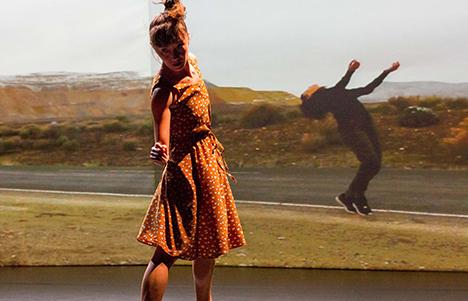
Zvi Gotheiner was born and raised in kibbutz Mesilot in northern Israel. He began his artistic career as a violinist with the Young Kibbutzim Orchestra, where he attained the rank of soloist and concertmaster. He began dancing at age 17 and soon after formed his first performance group. He joined the Bat-Sheva Dance Company after serving in the army. Zvi arrived in New York in 1978 on a dance scholarship from the America-Israel Cultural Foundation and danced with the Joyce Trisler Dance Company and Feld Ballets/NY. After directing Tamar Ramle and the Jerusalem Tamar Dance Companies in Israel and the Israeli Chamber Dance Company in New York, he founded ZviDance in 1989. He has created more than 25 works for his company, among them Dabke, which was named by The New York Times as one of the ten best dance works of 2013. Zvi is a highly regarded ballet teacher, described by The New York Times as the “Zen Dance Master of New York.” Most recently, Zvi received distinguished teaching awards from the American Dance Festival and the Kaatsbaan International Dance Center’s Playing Field.
About Pentacle
Since 1976, Pentacle has been a model in the arts administration field, enabling performing artists to focus on what they do best—create art and engage with audiences. Pentacle designs and provides unique and robust programs of support for performing artists at critical stages in their careers. At its core, Pentacle believes in the unique and critical role the artist citizen plays in our democracy, and that art and artists inspire people in many communities to understand, articulate, and seek to attain their highest aspirations for the world. At the same time, Pentacle enriches the cultural landscape through cross-sector partnerships in multiple communities across NYC and the U.S.
Image Credit
Photo of Davalois Fearon by Andrew Lee
Photo of Antonio Ramos by Anaya Migel
Experience site-specific dance in the Rubin galleries by some of New York’s most inspiring choreographers, presented in partnership with the arts organization Pentacle. The performances will reflect the theme of power, which radiates from our galleries as part of a yearlong exploration of the topic.
On Wednesday, May 8, witness a performance from choreographer Francesca Harper at 6:00 PM, 6:45 PM, or 7:30 PM.
Pentacle’s Dance Series at the Rubin Museum of Art is supported by private funds from Mertz Gilmore Foundation and the Howard Gilman Foundation, and by public funds from the New York City Department of Cultural Affairs in partnership with the City Council.


About the Choreographer
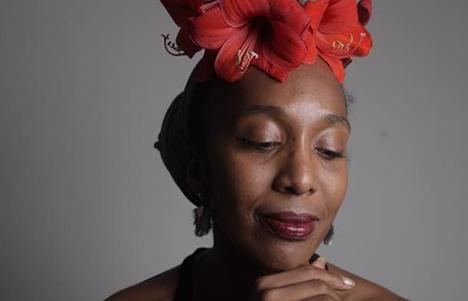
Francesca Harper is an internationally acclaimed, multi-faceted artist. After being named Presidential Scholar in the Arts and performing at the White House her senior year of high school, she joined and performed soloist roles with The Dance Theater of Harlem and later as a Principal Dancer in William Forsythe’s Ballet Frankfurt.
Harper has choreographed works for Alvin Ailey American Dance Theater, Ailey II, Tanz Graz, Hubbard Street II, Dallas Black Dance Theater, and her own company, The Francesca Harper Project, which was founded in 2005 and tours internationally. She has appeared in four Broadway productions, with leading roles in Sweet Charity and Sophisticated Ladies. She also served as a Ballet Consultant for the Oscar winning film Black Swan.
Harper is the Artistic Director for the Movement Invention Project and also recently served as Movement Director for Nick Cave’s The Let Go, an exhibit commissioned by the Park Avenue Armory. She was awarded a two-year choreographic fellowship with Urban Bush Women, providing support toward her latest dance-theater work “An Unapologetic Body,” still currently in development.
Her recent engagements include a collaboration with ballerina Wendy Whelan, choreography for a Planned Parenthood video campaign, and a collaboration with Nona Hendryx, Carrie Mae Weems, and Niegel Smith in a new production entitled Refrigerated Dreams at The Public Theater.
About Pentacle
Since 1976, Pentacle has been a model in the arts administration field, enabling performing artists to focus on what they do best—create art and engage with audiences. Pentacle designs and provides unique and robust programs of support for performing artists at critical stages in their careers. At its core, Pentacle believes in the unique and critical role the artist citizen plays in our democracy, and that art and artists inspire people in many communities to understand, articulate, and seek to attain their highest aspirations for the world. At the same time, Pentacle enriches the cultural landscape through cross-sector partnerships in multiple communities across NYC and the U.S.
Image Credit
Photo of Davalois Fearon by Andrew Lee
Photo of Antonio Ramos by Anaya Migel
Experience site-specific dance in the Rubin galleries by some of New York’s most inspiring choreographers, presented in partnership with the arts organization Pentacle. The performances will reflect the theme of power, which radiates from our galleries as part of a yearlong exploration of the topic.
On Wednesday, April 24, witness a performance from choreographer Antonio Ramos at 6:00 PM, 6:45 PM, or 7:30 PM.
Pentacle’s Dance Series at the Rubin Museum of Art is supported by private funds from Mertz Gilmore Foundation and the Howard Gilman Foundation, and by public funds from the New York City Department of Cultural Affairs in partnership with the City Council.


About the Choreographer
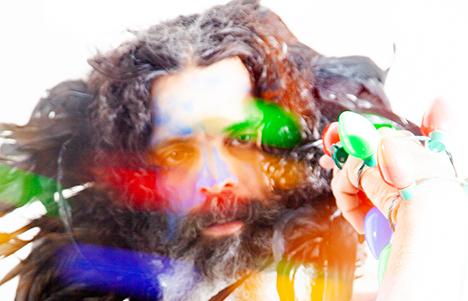
Antonio Ramos was born and raised in Puerto Rico, where he trained in jazz, salsa, and African dance. He later received a B.F.A. in Dance from SUNY Purchase. Antonio began his career performing with Ballet Theatre of Puerto Rico, Ballet Hispanico of New York, Ballet Concierto and Ballet Municipal (PR). “©
His choreography has been produced at Hostos College, The Kitchen, New York Live Arts, Dance Theater Workshop, SUNY Purchase, BAAD!, Dixon Place, P.S. 122, Joe’s Pub, Danspace Project, Lexington Center for the Arts NY, DanceNow Downtown, Princeton University, Movement Research, BAX, Galapagos Art and Performance Space, Williamsburg Art Nexus, Fringe Festival 2000 at Theatre La Chappelle, The Painted Bride, Cornell University and CPR. Recently, he presented work at the American Realness Festival at the Abrons Arts Center and was commissioned to present the world premiere of his latest work “Almodovar Dystopia” at Dixon Place in Manhattan.
“©”©Antonio is also a Licensed Massage Therapist, Zero Balancing, and Watsu Practitioner and a certified instructor-practitioner in The Feldenkrais Method.
About Pentacle
Since 1976, Pentacle has been a model in the arts administration field, enabling performing artists to focus on what they do best—create art and engage with audiences. Pentacle designs and provides unique and robust programs of support for performing artists at critical stages in their careers. At its core, Pentacle believes in the unique and critical role the artist citizen plays in our democracy, and that art and artists inspire people in many communities to understand, articulate, and seek to attain their highest aspirations for the world. At the same time, Pentacle enriches the cultural landscape through cross-sector partnerships in multiple communities across NYC and the U.S.
Image Credit
Photo of Davalois Fearon by Andrew Lee
Photo of Antonio Ramos by Anaya Migel
Losar, the Tibetan New Year, is celebrated all over the Himalayas. It’s 2146 in the Tibetan calendar, the year of the Earth Pig. People born in Earth Pig years are organized, happy, relaxed by nature, and unaffected by criticism.
Chime Dolma and Rinchen Dolma from YindaYin Coaching Center in Jackson Heights, Queens, will demonstrate how Losar is celebrated in Tibet and share their vision for the future of education in New York’s Tibetan refugee community. Children from the YindaYin School will perform traditional Tibetan dance in spectacular costumes to ring in the year.
This program is co presented with the YindaYin Coaching Center.

About the Presenters
YindaYin Coaching is a 501(c)(3) nonprofit organization registered in the State of New York. “YindaYin” literally translates to “yes, of course!” in the Tibetan language. YindaYin Coaching is the result of countless discussions between founders Chime Dolma and Tashi Tenzin. Influenced by their experience as educators, they are passionate about empowering young people through education and mentorship. YindaYin Coaching is open to all families living in New York City, but it has its roots in serving the refugee/ immigrant community of Queens.
As immigrants themselves, the founders have worked closely with Tibetan immigrants and refugees in Queens and have therefore witnessed the challenges they face. They hope to provide a platform that can help children of immigrant families take full advantage of the opportunities that the educational system offers in America. That is why YindaYin Coaching Center is strategically located in Jackson Heights, a subsection of Queens with one of the densest Tibetan populations as well as a other diverse immigrant communities. Students are encouraged to embrace the diversity of their community and learn to respect people from all backgrounds. Fostering diversity and compassion in future generation is a key element of YindaYins’s program, equal to achieving academic excellence.
Rinchen Tara is the Center Director of YindaYin Coaching. She obtained her B.A from Duke University in International Comparative Studies and will begin her M.A. in Education at Teachers College, Columbia University in 2019. Rinchen was born into a semi-farming family in Tibet and is one of the first children in her region to attend school, let alone university. She believes that education should not be taken for granted, and she hopes to impart that respect for knowledge to her students.
Chime Dolma is the President and Co-founder of YindaYin Coaching. She holds a M.A. in International Educational Development from Teachers College, Columbia University and a B.A. in Political Science and Chinese Language from Middlebury College. She is currently the Assistant Director of Service Learning and a faculty member in the History and Global Studies Department at Riverdale Country School in the Bronx. Chime Dolma grew up in Tibet as an illiterate nomadic yak herder before leaving behind her family to pursue a chance at education in India. She immigrated to the United States, and despite experiencing hardships she was the recipient of several notable scholarships. She is regularly invited to speak at various venues on education policy and her unique experience.
Power is the invisible hand that shapes our lives—omnipresent but inevitably fleeting, and often based on illusions. As such, it makes rich fodder for creativity. The Rubin and Voices of Poetry present an evening of provocative poetry and music as part of our yearlong exploration of power.
This event will feature a sextet of distinguished and award-winning poets—Iraj Anvar, Jericho Brown, Cornelius Eady, Elizabeth T. Gray Jr., Sanjana Nair, and Daniel Tobin—who will share their work on the nature of power and the illusory qualities thereof.
A book signing by the poets will follow the program.

About the Poets
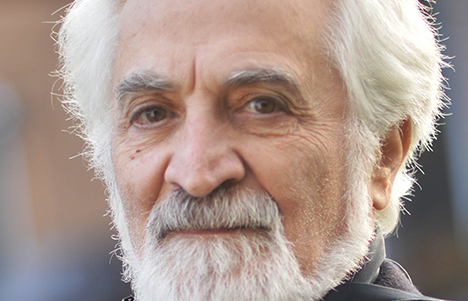
Iraj Anvar was born in Tehran, Iran and studied acting and directing with Alessandro Fersen (Studio di Arti Sceniche) in Rome. When he returned to Iran, he became one of the leading figures in the avant-garde theater in Tehran. He was a co-founder of the Tehran Theater Workshop, where he translated, adapted, and directed several plays, including adaptations of ancient Persian literature. After a distinguished career, in 1978 he traveled to the U.S., having obtained a scholarship to attend NYU. After the Iranian Revolution, he decided to remain in this country and, while teaching Persian Language and Literature at the department of Near Eastern Studies at NYU, received his PhD from NYU in 1991. In 2000, his English translation of Forty-Eight Ghazals, by the renowned Persian 13th century poet Jalal-addin Rumi, was published by Semar publishers. His second translation of Rumi’s poems was published by Morning light publishers under the title of Say Nothing. His artistic activities include poetry readings and “naqqali,” a form of storytelling in NYC and other U.S. cities. He currently teaches Persian language and culture at Brown University and has a new translation of Rumi’s poems to be published soon.
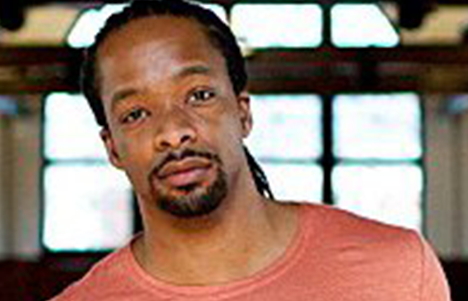
Jericho Brown is the recipient of fellowships from the Guggenheim Foundation, the Radcliffe Institute for Advanced Study at Harvard, and the National Endowment for the Arts. Brown’s first book, Please (New Issues 2008), won the American Book Award. His second book, The New Testament (Copper Canyon 2014), won the Anisfield-Wolf Book Award. His third collection, The Tradition, will be published by Copper Canyon in 2019. His poems have appeared in Buzzfeed, The New Republic, The New York Times, The New Yorker, The Paris Review, TIME magazine, Tin House, and several volumes of The Best American Poetry. He is an associate professor and the director of the Creative Writing Program at Emory University.
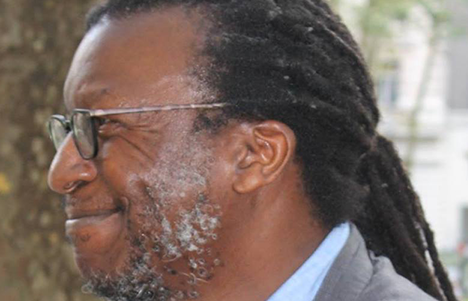
Cornelius Eady—co-founder (with Toi Derricote) of Cave Canem, a nonprofit organization that supports emerging African American poets—has published more than half a dozen volumes of poetry, among them Victims of the Latest Dance Craze (1985), winner of the Lamont Poetry Prize from the Academy of American Poets; The Gathering of My Name (1991), nominated for a Pulitzer Prize; and Brutal Imagination (2001), a National Book Award finalist; and Hardheaded Weather: New and Selected Poems (2008). Brutal Imagination includes a theater sequence based upon the notorious 1994 incident in which Susan Smith, a white woman from South Carolina, claimed that an African American man had kidnapped her children. The FBI searched for the man until Smith confessed the truth: she had invented the man and had drowned the children. Eady’s sequence, which creates a detailed persona of the imaginary suspect, was adapted into an off-Broadway play that won the Newsday Oppenheimer Award. Eady also collaborated with Diedre Murray on a libretto for a roots opera, Running Man, based on his poems, which was a finalist for the Pulitzer Prize in Drama. Eady has received grants from the National Endowment for the Arts, the Guggenheim Foundation, the Rockefeller Foundation, and the Lila Wallace”“Reader’s Digest Fund.
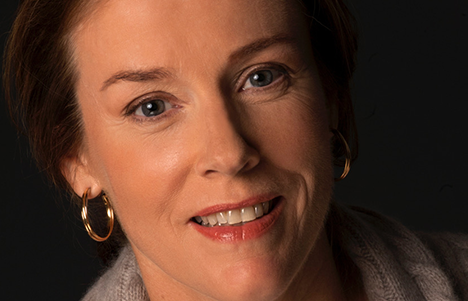
Elizabeth T. Gray, Jr. is a Pushcart Prize nominated poet and translator. She has published a poetry collection, SERIES | INDIA (Four Way Books, 2015), and has translated classical and contemporary Persian poetry including The Green Sea of Heaven: Fifty Ghazals from the Diwan-i Hafiz-i Shirazi (1995); Iran: Poems of Dissent (2013); and Let Us Believe in the Beginning of the Cold Season by Forough Farrokhzad (in Mantis, 2014). Sections of the Tibetan-Mongolian folk epic The Life of King Kesar of Ling—co-translated with Dr. Siddiq Wahid of the University of Kashmir—appeared in Columbia University Press’s Sources of Tibetan Tradition (2013). Gray’s work has appeared in Little Star, Talisman, Hyperallergic, Paris Lit Up, The Kenyon Review Online, Poetry International, The Harvard Review, New England Review, Ploughshares and elsewhere. She has served as a Guest Editor for Epiphany and the New Haven Review. She serves as Chairman of The Beloit Poetry Journal Foundation and as Corporate Secretary of Friends of Writers. She joined the Board of Human Rights and Democracy in Iran, based in Washington, D.C, in 2018, and served as Chair of the Iran Human Rights Documentation Center, in New Haven, CT (2009-2015). She holds a BA and JD from Harvard University and an MFA from Warren Wilson College.
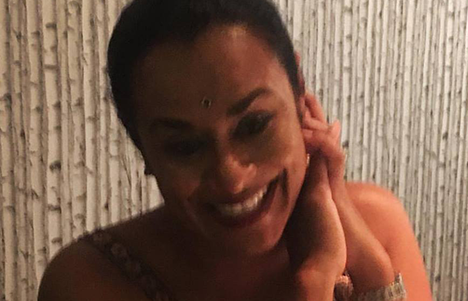
Sanjana Nair—before joining the faculty at John Jay College of Criminal Justice (CUNY)—taught at Miami University and NYU. Her work has been published in Spoon River Poetry Review, Fence Magazine, The Equalizer, Swwim, Anastamos Interdisciplinary Journal, No, Dear Magazine and Juxtaprose Magazine. An early member of the Asian American poetry organization Kundiman, Nair served as Treasurer after the group earned a NYFA award as well as the reading series director and emcee at Verlaine in NYC. She was a guest poet on NPR’s program Soundcheck, and represented the Poets & Writers sponsored group Office Hours in a reading at Barnes & Noble in Union Square.
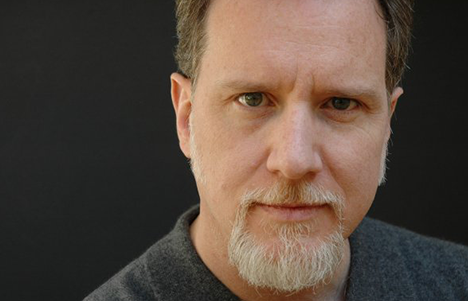
Daniel Tobin, a professor of English at Emerson College in Boston, is the author of eight books of poems, Where the World Is Made (University Press of New England, 1999); Double Life (Louisiana State University Press, 2004); The Narrows (Four Way Books, 2005); Second Things (Four Way Books, 2008); Belated Heavens (Four Way Books, 2010); The Net (Four Way Books, 2014); From Nothing (Four Way Books, 2016); and Blood Labors (Four Way Books, 2018). He has also authored The Stone in the Air (Salmon Poetry, 2018), a translation of the work of Paul Celan. Among his awards are the Massachusetts Book Award in Poetry, “The Discovery/”‹The Nation Award,” The Robert Penn Warren Award, the Greensboro Review Prize, the Robert Frost Fellowship, the Katherine Bakeless Nason Prize, the Julia Ward Howe Prize, the Stephen J. Meringoff Award in Poetry, and creative writing fellowships in poetry from the National Endowment for the Arts and the John Simon Guggenheim Foundation. His poems have appeared in such journals as The Nation, The New Republic, The Harvard Review, Poetry, The American Scholar, The Paris Review, The Southern Review, The Sewanee Review, The Hudson Review, The Kenyon Review, Image, The Times Literary Supplement (England), Stand (England), Agenda (England), Descant (Canada), and Poetry Ireland Review. In addition to his poetry and translations, Tobin has authored several critical studies, including Passage to the Center: Imagination and the Sacred in the Poetry of Seamus Heaney (University of Kentucky Press, 1999); Awake in America (University of Notre Dame Press, 2011).
About Voices of Poetry
VOP was formed by Pushcart Prize nominated poet and poetry activist Neil Silberblatt. VOP has organized and presented more than 150 poetry events in four states: NY, NJ, CT and MA. Those events—which have featured Poets Laureate and Pulitzer Prize winners/nominees, as well as those who have not (yet) published a word—have been presented at numerous venues, including Tompkins Square Library, Jefferson Market Library, and Cornelia Street Café in NYC; the New Britain Museum of American Art; The Aldrich Contemporary Art Museum in Ridgefield, CT; and The Mount / Edith Wharton’s home in Lenox, MA.
